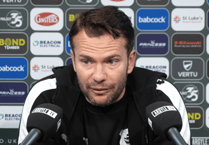I WAS in Manchester last week I popped into the National Football Museum. A fascinating place for a football fan like myself but it didn’t kick off well when the friendly chap at the reception asked me which team I supported. ‘Plymouth Argyle’ I said proudly. ‘Shame about Saturday,’ replied the smiling Mancunian, ‘yer lost 3-0 at home to Grimsby.’ Thanks for reminding me pal!
It was well worth a visit — and with the expected historical memorabilia, hall of fame and early BBC radio commentaries, a couple of hours flew by. Two things caught my eye. The first was a comment by that Old Red Devil himself, Sir Alex Ferguson. Asked about the effect that the mountain of money from satellite broadcasting has brought to the Premier League he said that ‘he who sups with the devil has a price to pay.’ Too true Sir Alex.
Which brings me to the second — an excellent exhibition of England’s World Cup triumph in 1966. I remember as a boy watching the final on our antiquated black and white television as England battled against West Germany. Geoff Hurst scoring a record hat-trick; Bobby Moore wiping his hands before meeting the Queen to lift the trophy; a toothless, grinning Nobby Stiles jigging in delight on the pitch; the whole nation celebrating (except the Scots of course). Marvellous stuff.
Of course little did I realise as a seven year-old that I witnessed probably the only England World Cup victory in my lifetime. Perhaps the reason for our subsequent failure is the success of that Premier League whose televised games are in demand all over the world. It has attracted some of the world’s best players but consequently there are few talented English players for the national manager to choose from. As the canny Scot Sir Alex said, there is a price to pay.
Our defeat to plucky minnows Iceland in the Euros demonstrates our difficulty of overcoming smaller national teams, let along beating the ‘big boys’ when it matters and illustrates the depth of decline of our national team at the top level.
So if you were to ask me what England’s chances of ever repeating the triumph on that glorious day of July 30, 1966 what would I reply?
I shall leave you with the much hackneyed phrase of the much missed football commentator, the late Kenneth Wolstenholme. As Hursty was about to thump in the third on that unforgettable day he said — ‘Some people think it’s all over, it is now!’





Comments
This article has no comments yet. Be the first to leave a comment.